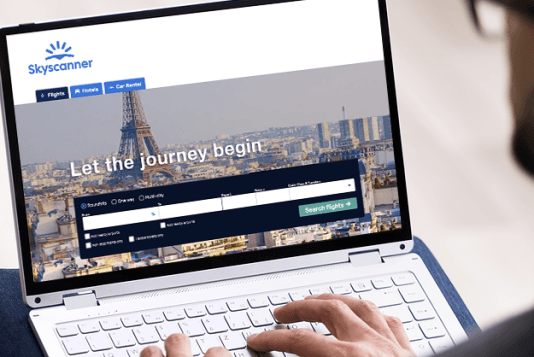Skyscanner + UserTesting


About Skyscanner
Founded in 2003, Skyscanner is a leading travel company dedicated to putting travelers first by making booking trips as simple as possible. Skyscanner helps millions of people in 52 countries and over 30 languages find the best travel options for flights, hotels, and car hire every month.
Skyscanner achieved



Challenge
Within 90 days of the onset of the 2020 pandemic, entire industries found themselves in a catastrophic fight for survival, few more so than the travel industry.
Oli Mival PhD., Director of User Research at Skyscanner and Principal Research Fellow at Edinburgh Napier University's Centre for Interaction Design, knew that Skyscanner would need to innovate and adapt like everyone's livelihoods depended on it—because travel had fundamentally changed.
How would Oli and his team help Skyscanner to navigate through this once-in-a-lifetime storm?
Solution
With a background in psychology and computer science and over 50 publications on UX and Interaction Design, Dr. Mival knew that a problem well-stated is a problem half-solved.
In an interview with Econsultancy, he said, "the most important thing is making sure the organisation knows what they're trying to achieve before starting." Mival helped define five core question themes to address as a result of the pandemic:
- Who are the people still booking travel during the pandemic, what are their motivations, and why?
- Who are the people currently considering booking travel, what are their motivations and reservations, and why?
- Who are the people who are not currently willing to book travel, what are their reservations, and why?
- Why do these groups increase, decrease, and fluctuate?
- What can Skyscanner do to encourage the number of people in groups 1 and 2 to increase?
Mival's team took a holistic research approach that combined data science and analytics from behavioral activity on their website with rich qualitative human insights from interviews of customers and prospective travelers. Mival knew it would be vitally important for executives to fully buy-in and grasp the importance of qualitative insights due to the unique ability of this type of information to explain the "why behind the what" and give immediate confidence to business decision makers.
This approach not only helped drive clarity to their mission but helped gain complete buy-in from Skyscanner's CEO and Chief Product Officer, paving the way for a successful initiative.
Dr. Mival explained more about his approach in this UserTesting webinar, calling attention to the wide array of resources and support that continuously help his team to uncover actionable human insights so stakeholders can make better decisions faster—resources such as training courses available in the UserTesting University, pre-formatted templates for rapid research, and expert support from UserTesting's Professional Services and Support teams. Mival said, "UserTesting is phenomenal.”
“We got a sense of the scope and scale of things from our pulse surveys, but it was critical to have richer human insights from UserTesting to gain empathy and understand what we were seeing in the numbers. So, from the middle of March, we began speaking to 20 travelers from across the world every other week,” Mival said. “UserTesting was and continues to be our core platform for understanding what people in, say, South Korea are thinking, or Brazil, China, India, Germany, etc. It was really important to us that we had a global perspective so that we weren’t being too UK-centric. Without UserTesting, that would have been nearly impossible.”
Outcome
The results from this approach helped Skyscanner develop new frameworks for understanding customers with greater confidence. Armed with these insights, their global enterprise felt empowered to pivot like a startup, which resulted in shifting resources to create compelling new campaigns with messaging that resonated well during the pandemic, raising brand awareness and strengthening brand equity.
While Skyscanner doesn't publicly share its speed and cost savings from UserTesting, Forrester's Total Economic Impact analysis revealed the average ROI from a UserTesting subscription over three years is 665% across composite companies, and showed an average payback period of less than three months. This is because development cycles are reduced by two weeks on average, while online conversion rates improved 60% with a 140% lift in average annual customer spend, according to Forrester.
In Dr. Mival's case, his approach allowed Skyscanner to share insights throughout his organisation—creating an ever-stronger foundation of customer empathy and understanding, realign their internal structure to be better aligned with their data sciencece team, and helped drive the direction of the company and product when stakes were high.
“I’m really lucky—I actually get to work across pretty much every discipline at Skyscanner,” Mival said.
And that foundational understanding has allowed them to pivot rapidly and be more agile in how they serve travelers and partners."Now more than ever it’s important that brands understand not just what their customers are thinking and feeling, but WHY. Thanks to UserTesting, we’re observing and listening to travelers every week. The insights we're uncovering are being used to make better decisions faster across our entire business. It's been invaluable to help us pivot. Our marketing activities shifted to giving travelers hope, help, and showing empathy, resulting in the launch of a global social media campaign called #WeWill," said Jo McClintock, Global Brand Director at Skyscanner.
It wasn't just Marketing that benefited. Skyscanner also successfully introduced new products and features to help travelers address the uncertainties of traveling during the pandemic.
This included a continuously updated interactive travel regulation map on Skyscanner's website, plus new options for customers to buy insurance for medical, trip cancellation, and airline insolvency coverage, including protection against travel disruption and sickness caused by COVID-19. The research also contributed to Skyscanner's The New World of Travel report.
When something as turbulent as a pandemic hits, it can profoundly affect an organisation's visibility to changing customer needs and motivations. UserTesting is uniquely positioned to give clarity of understanding into why people think, feel, say, and do the things they do, thus empowering decision makers to clear the fog of uncertainty and innovate their way to success.
 Oli Mival, PhDDirector of User Research, Skyscanner
Oli Mival, PhDDirector of User Research, Skyscanner“In today’s uncertain and changing travel landscape, the most important thing we can do is to give travelers the confidence they need when making travel arrangements. UserTesting gives us the human insight that allows us to do just that.”



